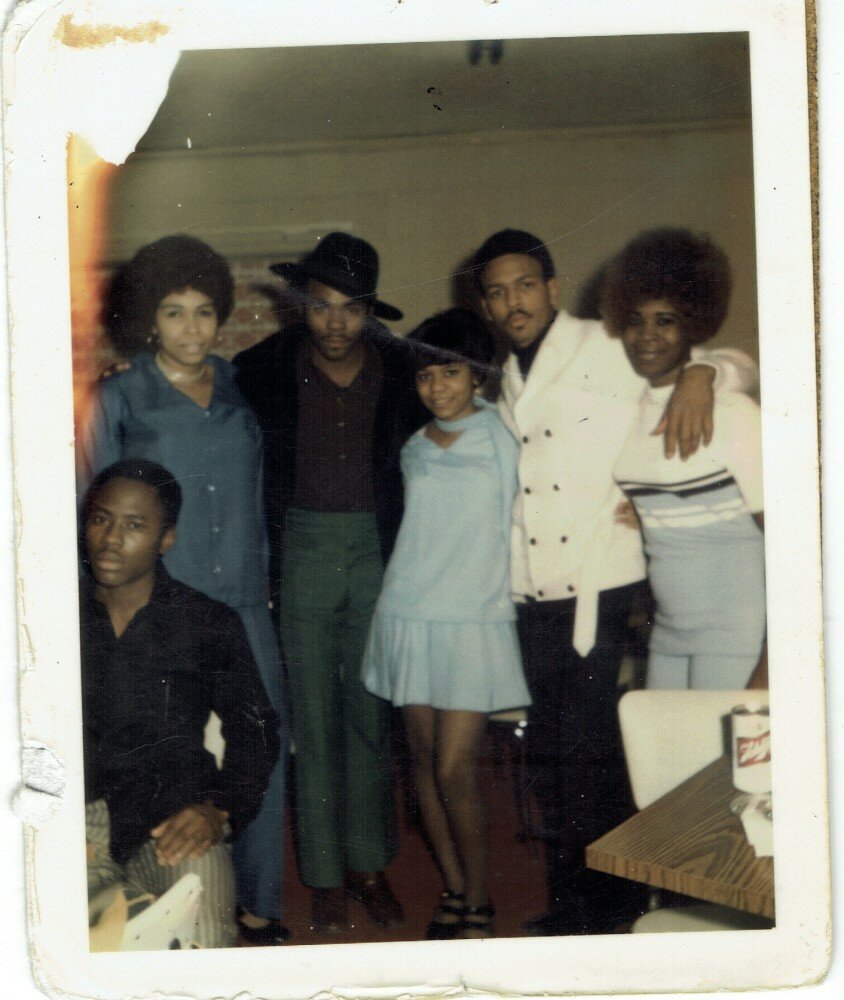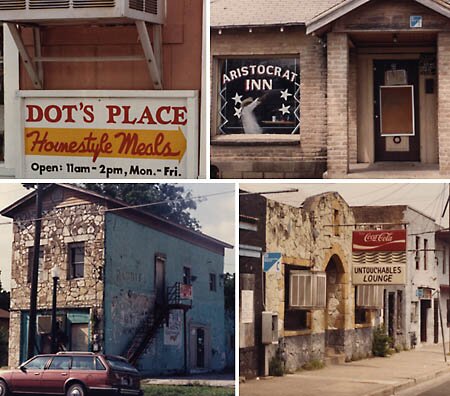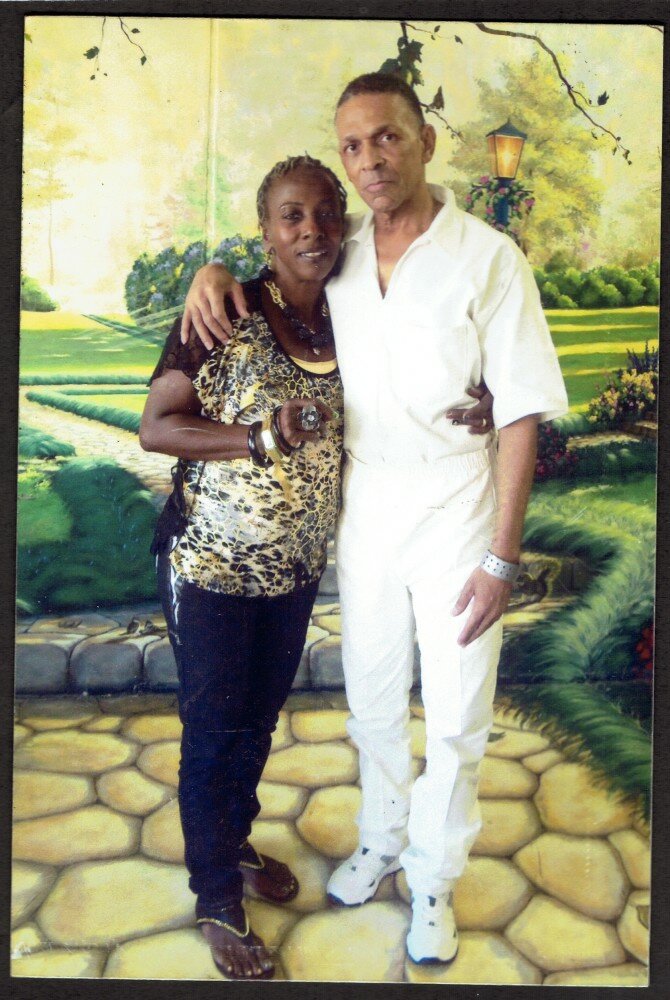Otis and Lola at Nubian Queen’s. Photo by Otis Ike.
Otis Bell sat on the bed, while Wizard and Lil’ Sam took up chairs in the big room of the house at 12th and Chicon that used to be the Aristocrat Inn. The memories flowed between these three former ‘60s and ‘70s running buddies, who have all recently returned to East Austin after a collective 72 years in prison.
“The Harlem Theater was right next door to here,” said Edward “Wizard” McMillon, 62. “That’s where we’d go see movies like King Kong and The Magnificent Seven.”
After the movies there were so many nightlife options on E. 12th, which everyone called “the Ends” since 12th and Chicon was the last stop on the streetcar. It was also hopping on E. 11th, nicknamed “the Cuts” and anchored by “Chitlin Circuit” hotspots the Victory Grill and Charlie’s Playhouse. After hours, which was midnight back then, the party moved to Ernie’s Chicken Shack on Webberville Road, which stayed open all night, with lots of gambling in the back room. Otis and the fellas rattled off more club names: White Swan, I.L. Club, the Hideaway, Good Daddy’s, Sam’s Showcase, T.C.’s Lounge, the Yellow Jacket, Untouchables Lounge, Alabama Club, the Oak Tree, Brown Derby and Shorty’s Bar. Missed a few- I couldn’t write that fast.
Barton’s Tavern was at the Northeast corner of 12th and Chicon and next to that was Blue-Eyed Liquor Store, nicknamed so because the proprietor was a black man with blues eyes. Old men from prison can tell you more about the old neighborhood than the Austin History Center, that’s for sure.
“This neighborhood was all black,” Otis said. “Black as far as you could see, and as long as we kept it to our side of the freeway, we was cool.” Drugs, gambling and prostitution went on without much concern from law enforcement, as long as nobody got killed.
“There were only two things a black man could do in East Austin,” says Selma “Lil’ Sam” McLennan, a notorious ex-pimp. “You either joined the military or you hustled in the street. I ain’t never had a job.”

Otis and Lil’ Sam with Texas cap.
McLennan, 70, tells you straight up he went to prison for 28 years this last time because he murdered the owner of Martin’s Drive Inn on Weberville Road in 1986. “I killed someone there in 1971, too,” he says. “That was the roughest place in town, man. Everybody had a piece.”
McMillon was a heroin addict who robbed and stole to feed his habit. He told us all about that in part one of this series last week. But Otis, who’s been out of prison the shortest time, doesn’t want to talk about his criminal record. He just got out after 27 years, man. Let him be free, at least in his mind, a little while before you start bringing up the negative.

Otis Bell in white jacket with friends at the Hideaway circa 1972.
We’ll give him that, but since I did pay $7.95 for a copy of court papers pertaining to his case, you can read them at the end of the post if you’re interested. Basically, Otis received a life sentence in 1988 for shooting his cousin, who died a week later. The incident was March 2 and just two months later, Otis Bell was shipped off- he’d say railroaded- to the penitentiary. In those court papers, which used Bell’s nickname “Trouble” without protest from a court-appointed lawyer, you’ll read about a man of the same age and name, but that’s not the Otis Bell you’ll find waiting tables at Nubian Queen Lola’s Cajun Kitchen on Rosewood Avenue. It’s not the Otis I’ve been over to see four or five times in the past month.
It started when I ran into Lola Stephens on E. 12th one night. “I want you to meet my husband Otis,” she said. “He just got out of prison.” I was there checking out the transformation of the corner that once was as close as Austin got to The Wire. And now it’s got Dozen Street, a piano bar like none other, and Full Circle Bar, devoted to hardcore skeeball players. There’s also the blues-themed pizza joint King Bee Lounge and the rock box Badlands, plus an art gallery and a hip food court going in. They’ve all got great patios and everyone sits outside smoking, where they can hear the music just fine. All these new businesses have kept a little bit of the grit, even the makeover knights of the Full Circle, because 12th and Chicon ain’t gonna just wash away like that.
White kids riding around on bicycles?! Otis Bell couldn’t believe that shit when he came back to 12th and Chicon in July. The hoodrats are still there, but they’re outnumbered by a younger generation, not intimidated by street people. East Austin has become the Brooklyn of Texas, the dangerous/cool ‘hood, with gentrification causing real estate values- and taxes- to soar. Many of the area’s settlers are being priced out, including those whose parents and grandparents were, basically, forced to live in East Austin, “The Negro District” of a 1928 city plan. Austin is the only big city in America to lose black residents, because they’re moving to the more affordable suburbs. Wealth rules the city.
McLennan lives over on E. 18th Street with his sister, who has no intention of moving, he said. “There have been some white folks trying to get my sister to sell the house to them, but she won’t do it. She’ll make a lot of money, but where’s she gonna go? All she knows is the East Side.”

Photos of East Side facades from Tary Owens Archives. The former Aristocrat is where Otis and Lola live.
There’s a Cajun restaurant, the Big Easy, on E. 12th and as I was wondering if Sister Lola was involved, there she was. She lives next door to the Big Easy, so, yeah I stopped in to meet Otis that night. “Did you go to Anderson?” I asked, which is always the greatest ice breaker in old school East Austin. Yeah, Otis said, graduated in 1965. Drafted into the Army in ’66.
He went into a box and pulled out an ornate, yellow and black, Anderson High Yellow Jackets belt he made while locked up. “There ain’t shit to do in prison, so around 1990 I started working in the craft shop with the leather men,” he said. Michael Lewis and Michael Heidt, a black man and a white man, were Bell’s mentors, but his grandfather William Henry Bell made custom cowboy boots on Congress Avenue, so maybe it’s in his blood, too. He also started attending church regularly and helped build the Chapel of Hope in the Hughes Unit of Gatesville Prison, near Fort Hood, in 1998.

E. 12th St. at Chicon today. Photo by Otis Ike.
Occasionally, there would be a cellblock shakedown, where guards would toss the cells while the inmates stayed out in the yard for a few hours. “You had to grab what you could or they’d throw it away, so I went through this stack of newspapers I had been saving to read. And there was a story about Lola, about this woman who feeds the homeless and raises other people’s children,” he recalled. He read the article out in the yard and when he got back to his cell he started writing a letter. “Lady,” it started, “you got a big heart.” He said that God told him to write her and offer any help he could give. He could send her leather goods that he and his crew made, assembly-line style with Otis as the designer, and she could sell them and use the money for her mission.
“I asked Otis to send me a sample of the work and he made me a money bag,” Lola said. “Just holding that bag I felt something. There was a connection.” She sold the first batch of leather bags, boots and belts easily and sent Otis $600 in cash, figuring he was as down on his luck as anyone. He sent it back for her to use for food. Lola works six days a week at her restaurant and then on Sunday out her back door.
The youngest of 16 children of Rosie Robinson, Lola Stephens grew up in Lake Charles, La. and cooked with her mom growing up. She was raised strictly Pentecostal, but after graduating from Marion High in 1980, she took off on a bus to Hollywood. She visited a sister in Austin enroute to stardom and ended up staying. “I used to party in this house when it was the Aristocrat Inn,” she said one night recently. “But these days everything I do is for the Lord.” Lola starts more sentences with “God told me to…” than she does “I …”

Lola and Otis at Gatesville 2011.
In 2007, Otis got a letter from the City of Austin about his uninhabited house at 1804 E. 12th St. The house was passed to Otis after his father Willie, who owned a Gulf Station on E. 12th, died, and he’d been paying property taxes from prison. In the ’90s, the house was rented to someone who, without Otis’ knowlege, ran a drug-dealing operation and there was a danger of having the house torn down in a federal anti-drug program. But brother Joe was able to save the building, currently valued at just under $300,000. By 2007, the house had been vacant for almost 10 years, but the neighborhood was using Otis’ back yard as a dump. The city was threatening big fines and inflated removal fees if he didn’t clean it up. “I wrote to Lola and gave her the number of a relative who could maybe take care of that, but he never called her back,” Otis said. “So Lola hired a couple homeless guys to help her, then jumped the fence because she didn’t have a key, and cleaned the whole thing up herself. Ninety bags of garbage! And she didn’t know me from Adam.”
Lola asked if she could visit Otis in prison and he said sure, but made something clear: “I’ve already got a wife. And a girlfriend.” Otis was married to a former prison guard from the women’s unit in Gatesville. Didn’t faze Lola, who never missed a Saturday visit for a year. And the two wrote letters regularly. In one, Otis wrote “Are you afraid to fall in love with me?” Lola dashed off “Hell, no! Already in love.” They were married by proxy in 2008. Standing in for Otis was Mr. Lee, the white man who helped Lola get Nubian Queen off the ground in 2004 when she didn’t have a dime.
“I was done with men, but I’m not gay,” she said. “I prayed to God and told him that I wanted to marry his son, and he sent me Otis.”
Stop by and say ‘Hi.’ Nubian Queen Lola makes the best crawfish etoufee you’ve ever had. But you’ve gotta be patient, and relax. Good things take time, then Otis will bring it on out.

Photo by Otis Ike. 10/15
Otis Bell vs. the State of Texas:
0-otis-t-bell-v-state-texas-06-28-89